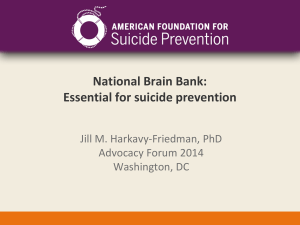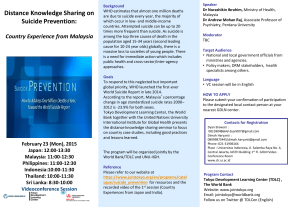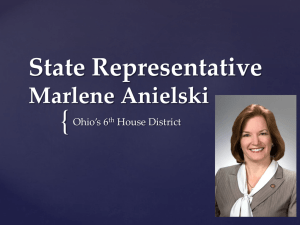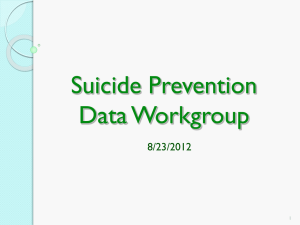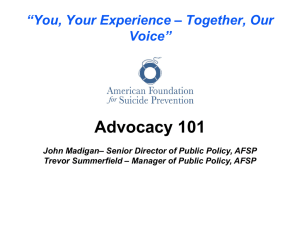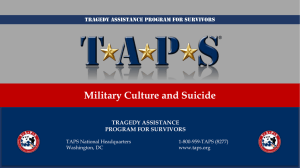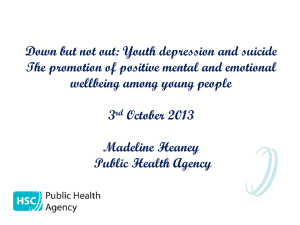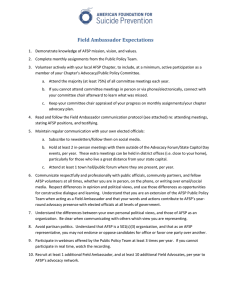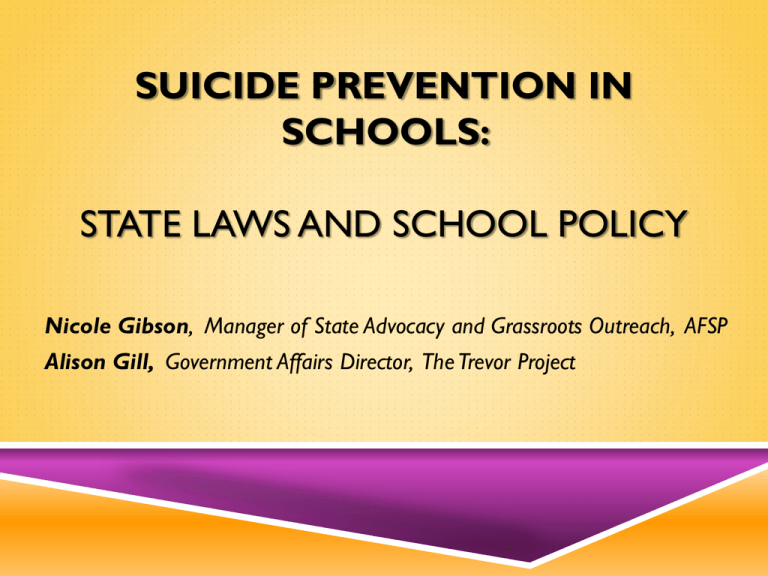
SUICIDE PREVENTION IN
SCHOOLS:
STATE LAWS AND SCHOOL POLICY
Nicole Gibson, Manager of State Advocacy and Grassroots Outreach, AFSP
Alison Gill, Government Affairs Director, The Trevor Project
“GET INTO THE SCHOOLS”
IN YOUR LOCAL COMMUNITIES
State laws and school policies can impact a
school’s willingness and ability to address suicide
prevention and mental health with students and
educators
THIS SESSION WILL HELP
ADVOCATES/CHAPTERS TO:
Understand the state laws and school district policies that impact
suicide prevention in your local schools
Learn how existing laws and policies can help or hinder your
efforts to work with schools and utilize AFSP programs and
resources
Learn about and how to use a brand new resource:
Model School District Policy on Suicide Prevention
Influence state law and school district policy changes
LEGISLATION / STATE LAWS
Suicide prevention in schools is influenced by state laws that:
Require or encourage suicide prevention training for educators
Require or encourage suicide prevention and or mental health education for
students
Require or encourage school district policies on suicide prevention
…and other unique laws
AFSP Chapters and Field Advocates have influenced proposed
laws, or “legislation” that address all of these areas
AFSP RESOURCES FOR SCHOOLS
More than Sad: Teen Depression
Available through local Chapters and for purchase online
More than Sad: Suicide Prevention Education for School
Personnel
Available through local Chapters and for purchase online
After a Suicide: A Resource for Schools
Free download from www.afsp.org
NEW RESOURCE:
Model School District Policy on Suicide Prevention
Available online at www.afsp.org
Collaborative effort with:
American School Counselors Association
National Association of School Psychologists
The Trevor Project
Includes model policy language for schools on preventing,
assessing the risk of, intervening in, and responding to youth
suicidal behavior
Also includes commentary and resources
Model School District Policy on
Suicide Prevention
ALISON GILL, ESQ.
Government Affairs Director
The Trevor Project
202-204-4730
Alison.Gill@thetrevorproject.org
Background of the Model
Model School District Policy
• Model was developed as a tool for school staff,
school board members, advocates, parents, and
students to develop and implement comprehensive
school district policies on suicide prevention
• Employing language from strong local policies
throughout the country and the expertise of
contributing groups, the model is comprehensive yet
modular
• School districts may use to draft new or amend their
own district policies based on the district’s unique
needs
Drafting Groups
Next Steps for the Model
• Working with partner organizations to promote the
model in states across the country
• Goal is to pass the model in key school districts, and
then others will follow
• Several gatekeeper training bills are being written to
require school districts to have a similar policy
• Ideally, we would like to see these types of policies
as a standard in school districts
Model Policy Components
General Provisions
The Model includes:
• Sidebars containing information and guidance
including:
– Parental involvement
– At-risk groups
– Bullying and suicide
– Communicating about suicide
• A purpose, general definitions relating to
suicide prevention, and the scope of the
policy.
Prevention
The policy requires:
• Designation of suicide prevention coordinators at the
district and school level to help implement and be
points of contact
• Annual professional development for staff on warning
signs and how to respond, with specific attention to
at-risk populations such as LGBTQ youth
• Additional training for school employed mental
health professionals
• Developmentally appropriate content for students
included in health curriculum
Intervention
• Procedure for assessment and referral for
at-risk youth
• Procedures for handling in-school suicide
attempts and out of school suicide
attempts
• Re-entry procedure for students returning
after mental health crisis
• Section on parental notification and
involvement
Postvention
• Procedures for the crisis team to follow after
they become aware of a suicide death
• Focus on properly handling interactions with
the family, communication with the
community, and avoiding risk of suicide
contagion
• Plan for facilitation external communication
with media, etc., in a way that is responsible
Resources
• Assortment of resources provided, including:
– Toolkits and guides on prevention
– Relevant research
– School programs
– Crisis services
– Guides on working with media
• Sample simplified version of policy for
student handbooks
HOW CAN WE USE THE MODEL POLICY?
Part of larger school resource package that can be provided
to schools
Conversation starter in states with no existing laws or
where you’d like to strengthen an existing law
Resource for states that currently require school district
policies as part of state law
INFLUENCING STATE LAW/SCHOOL
DISTRICT POLICY CHANGES
As Field Advocate and Chapter Volunteers, you can work
with the AFSP Public Policy Office and your local AFSP
Chapter to:
Propose a new state law
Amend an existing state law
Propose a new school district policy
Amend an existing school district policy
HOW DO I GET STARTED?
Lay the groundwork with local schools
Decide which elected officials/potential partners to
approach
Build a coalition of supporters
Ask the AFSP Public Policy Office to help!
LAYING THE GROUNDWORK WITH
LOCAL SCHOOLS
Immediately work toward developing strong working
relationships with the following:
State department/board of education
Professional associations (teachers, psychologists,
counselors, social workers, administrators, nurses)
Parent-teacher associations
Local school boards
Other nonprofits/state agencies that have a presence in
your local schools
LAYING THE GROUNDWORK WITH
LOCAL SCHOOLS
Engage local schools by providing resources proactively and also
on an as-needed basis:
Donate resources
Host educational events for school personnel/students
SC Chapter example – Suicide Prevention Institutes
UT Chapter example – collaborative training video
Invite schools to participate in local AFSP events
Offer to staff an AFSP table at school events
Help schools construct and update community
resource lists
BUILD A COALITION OF SUPPORTERS
Effective advocates BUILD and MAINTAIN
RELATIONSHIPS with:
Elected officials
Community “movers and shakers” and opinion leaders
Partner with community groups and nonprofit organizations
(both large and small, formal and informal):
Suicide Prevention
LGBTQ
Mental Health
Education
Disabilities Human Rights
First Responders
Local media
WHICH ELECTED OFFICIALS DO I
APPROACH?
Chief State School Officer
State Superintendent/Commissioner/Secretary of Education
Governor
In some states, the Governor leads the State Board of Education
and or appoints members
Legislators:
Senate/House Education Committee leadership (Chair/Vice-Chair)
Senate/House Education Committee staff
Your own Senator/Representative
Senators/Representatives you or your fellow Chapter volunteers,
friends, relatives, or coworkers have a relationship with
QUESTIONS TO ANSWER PRIOR TO APPROACHING
AN ELECTED OFFICIAL OR POTENTIAL PARTNER
What current law(s) and or policies are in place?
What is the state/school/district currently doing to address
suicide prevention and mental health? Are there gaps, and if so,
what are they? According to whom?
What solution am I offering?
What time/effort/cost will be associated with my solution?
Who else supports this solution? What are they willing/able to
contribute, if anything?
Who have I approached that is against this solution, if anyone,
and why?
HOW THE POLICY OFFICE CAN HELP
Know and can provide your state law(s)
Can guide you in which elected officials/potential partners
to approach, and how
Can help you prepare for meetings with elected
officials/potential partners – what to say, what to bring
Can provide follow-up when elected officials/potential
partners have questions or need additional information
Can connect you with other volunteers who have done this
before
…and other needed support or advice!
QUESTIONS?
NICOLE GIBSON, MSW
AFSP MANAGER OF STATE ADVOCACY & GRASSROOTS OUTREACH
202-449-3600 EXT. 105
NGIBSON@AFSP.ORG
ALISON GILL, ESQ
GOVERNMENT AFFAIRS DIRECTOR
THE TREVOR PROJECT
202-204-4730
ALISON.GILL@THETREVORPROJECT.ORG

